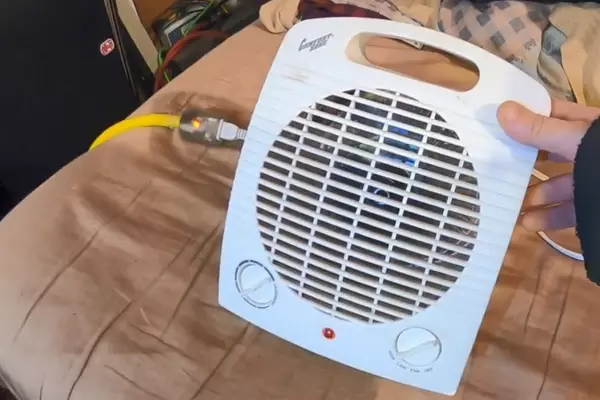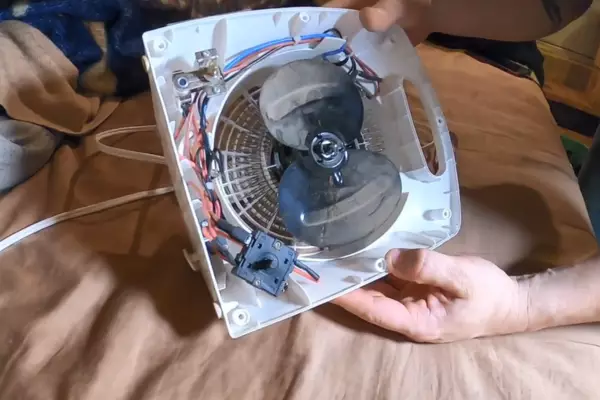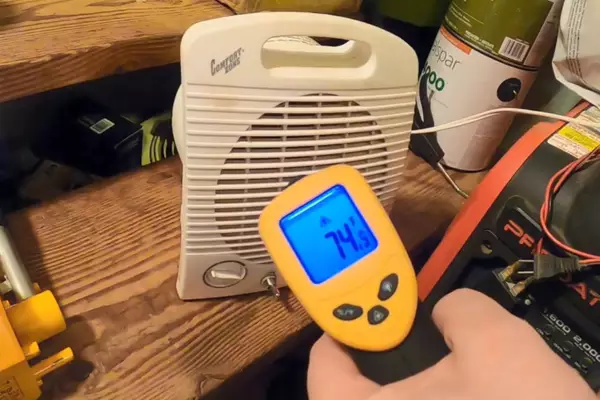Portable heaters, the very essence of convenience and comfort during chilly days, have become an indispensable part of many households and offices. Yet, they’re not immune to operational issues, one of which can be rather puzzling: your portable heater blowing cold air instead of the expected warmth.
This scenario, although inconvenient, is not necessarily indicative of a serious issue. It could be due to a range of factors from minor misconfigurations to more significant issues requiring professional attention. Essentially, the heater might be failing to convert electrical energy into heat energy efficiently.
Such a malfunction not only affects your comfort, but can also lead to higher energy costs. Therefore, addressing this issue promptly is crucial. In the upcoming sections, we will delve deeper into the probable causes and preventive measures to keep your portable heater running smoothly.
Contents
Exploring Portable Heaters
Portable heaters, known for their convenience and versatility, have become an integral component of many living and working environments. They are designed to generate heat through electrical energy, thus providing an effective and efficient way to heat up specific areas in homes or offices.
There are various types of portable heaters available, each suited to different environments and requirements. For instance, convection heaters work by heating the air that surrounds the unit, making them ideal for heating larger rooms. On the other hand, infrared heaters heat objects and people directly, providing quick and concentrated warmth, perfect for smaller spaces or individual use.

Additionally, ceramic heaters, an advanced form of convection heaters, use a ceramic element to heat air, which then gets circulated throughout the room. Another type, the oil-filled heaters, operate by heating oil inside the unit, which then radiates heat to the surrounding air.
These heaters offer several benefits, including portability, cost-effectiveness, and efficient heating. However, they also have some inherent limitations, such as restricted heating capacity and potential operational issues like blowing cold air.
Heater Blowing Cold Air: The Phenomenon
The primary function of a portable heater is to emit a steady stream of warm air, effectively raising the temperature of the space it’s heating. However, at times, you may find your heater blowing cold air instead. This abrupt transition can be frustrating, particularly during the colder months when you depend on your heater for warmth.
Several factors could be causing your heater to produce cold air, from simple thermostat misconfigurations to more serious mechanical failures. To fully understand and address this issue, it’s essential to familiarize yourself with the potential causes and their respective solutions.
Why Is Portable Electric Heater Blowing Cold Air?
Numerous reasons might explain why your heater is blowing cold air. These reasons typically fall into four main categories: thermostat misconfigurations, power supply complications, overheating issues, and dust and debris accumulation.
Thermostat Misconfigurations
The thermostat is an integral part of a heater’s mechanism. It regulates the temperature of the heater based on the settings inputted by the user. If the thermostat is set to a temperature lower than the room’s current temperature, the heater will perceive no need for additional heat and may blow cold air instead. To rectify this, simply adjust the thermostat to a higher setting.
Moreover, if your heater has a programmable thermostat and it’s been accidentally set to ‘cool’ mode or an incorrect schedule, it could result in the heater blowing cold air. Make sure to check your thermostat settings and adjust them accordingly.
Power Supply Complications
A reliable and steady power supply is crucial for a portable heater’s optimal performance. Inadequate power can hinder the heater’s ability to generate heat, causing it to emit cold air. This can occur due to various reasons such as faulty power outlets, electrical shorts, or even power surges.
It’s recommended to first check if your power outlet is working correctly by plugging another appliance into it. If the issue lies with the power supply, you may need to contact a professional electrician to solve it. Remember, dealing with electricity can be dangerous, so avoid trying to fix any electrical issues by yourself.

Overheating Issues
To prevent any potential hazards due to overheating, many modern portable heaters are equipped with an automatic shut-off feature. This feature activates when the heater’s internal temperature exceeds a certain limit, causing the heater to cool down by blowing cold air.
Overheating can occur if the heater is used continuously for extended periods, if it’s placed on an uneven surface causing instability, or if the heater’s vents are blocked. In such cases, it’s advisable to give the heater a break to cool down, ensure it’s placed on a stable surface, and keep the vents clear of any obstructions.
Dust and Debris Accumulation
Regular use of portable heaters can lead to the buildup of dust and debris inside the unit. This can interfere with the heater’s ability to generate heat effectively, causing it to blow cold air instead.
Routine cleaning and maintenance are crucial in preventing this issue. Be sure to follow the manufacturer’s instructions for cleaning to avoid damaging the unit. Typically, cleaning involves turning off and unplugging the heater, removing the cover, and gently cleaning the interior using a soft brush or compressed air.
What To Do To Prevent Cold Air From Portable Heaters?
Keeping your portable heater operating optimally requires a balance of mindful usage, regular maintenance, and preemptive measures to prevent the machine from blowing cold air. Below, we expand on key steps you can take:
Regular Check on Thermostat Settings
The thermostat is like the brain of your heater. It regulates temperature output based on the settings you input. However, incorrect settings can sometimes cause the heater to blow cold air. Ensuring that the thermostat is set to the correct temperature and mode can help prevent this issue.
- Temperature Setting: Regularly inspect the temperature setting. Make sure it’s set to a level higher than the room’s current temperature. This will allow the heater to perceive a need for additional heat, thereby preventing it from blowing cold air.
- Mode Setting: Some heaters have a ‘cool’ mode along with ‘heat’ mode. If your heater is accidentally set to ‘cool’ mode, it can cause the heater to blow cold air. Always check to confirm the mode setting on your heater.
- Programmable Thermostats: If your heater has a programmable thermostat, ensure that it’s set to the correct schedule. An incorrect schedule might make the heater operate at undesired times and in unwanted modes.

Ensure a Steady Power Supply
Heaters require a significant amount of power to operate efficiently. A steady power supply allows them to generate the required heat effectively. Therefore, it’s important to:
- Check Power Outlets: Regularly ensure your power outlets are functioning properly. Test the outlet by plugging another appliance into it. If the other device works fine, the issue might be with the heater. If not, you might need to call an electrician to inspect the power outlet.
- Use Adequate Extension Cords: If you’re using extension cords, ensure they can handle the heater’s power requirements. Low-quality or inadequate extension cords can cause power supply issues, leading the heater to blow cold air.
- Avoid Power Surges: Protect your heater from power surges by using a surge protector. A surge in power can potentially damage the heater’s internal components, affecting its performance.
Mindful Usage to Prevent Overheating
To prevent potential hazards due to overheating, many heaters come with an automatic shut-off feature. This feature activates when the heater’s internal temperature exceeds a certain limit. To prevent your heater from overheating:
- Use Timers: If your heater comes with a built-in timer, use it to schedule breaks for your heater. This prevents continuous operation and allows the heater to cool down.
- Ensure Adequate Ventilation: Ensure the heater’s vents aren’t blocked. Keep the area around the heater clear for proper airflow.
- Use on Stable Surfaces: Always use the heater on a stable, flat surface. An uneven surface can cause instability and may lead to overheating.
Routine Cleaning and Maintenance
Dust and debris accumulation can interfere with a heater’s performance. Regular cleaning and maintenance can prevent this:
- Cleaning Schedule: Establish a routine cleaning schedule based on the manufacturer’s guidelines.
- Safe Cleaning: Always unplug and turn off the heater before cleaning. Use a soft brush or compressed air to gently clean the interior of the heater.
- Professional Check-ups: For heaters that require more sophisticated maintenance, consider scheduling professional check-ups. A professional can identify and address issues that might not be evident to untrained eyes.
Frequently Asked Questions
Why is my brand new portable heater blowing cold air?
A new heater may blow cold air if the thermostat is incorrectly set or if there’s an issue with the power supply. Check these aspects first. If the issue persists, consider contacting customer support.
Can dust accumulation make my heater blow cold air?
Yes, dust and debris buildup can interfere with your heater’s heat generation, resulting in it blowing cold air. Regular cleaning can help avoid this.
Do portable heaters have a built-in safety feature for overheating?
Most modern portable heaters come with a safety feature that activates when the unit overheats. It may cause the heater to blow cold air as a preventive measure.
Conclusion
The conundrum of a portable heater blowing cold air can be disconcerting, especially during cold weather. However, understanding the underlying reasons can help you address the issue effectively.
Remember, regular maintenance and appropriate usage are your best allies in preventing such issues. Staying informed about your appliance’s operation and care can enhance its lifespan and your comfort.
Lastly, while the tips shared here can help you troubleshoot basic issues, don’t hesitate to seek professional help if necessary. Ensuring your heater works efficiently will ensure a cozy and comfortable environment for you and your loved ones.
